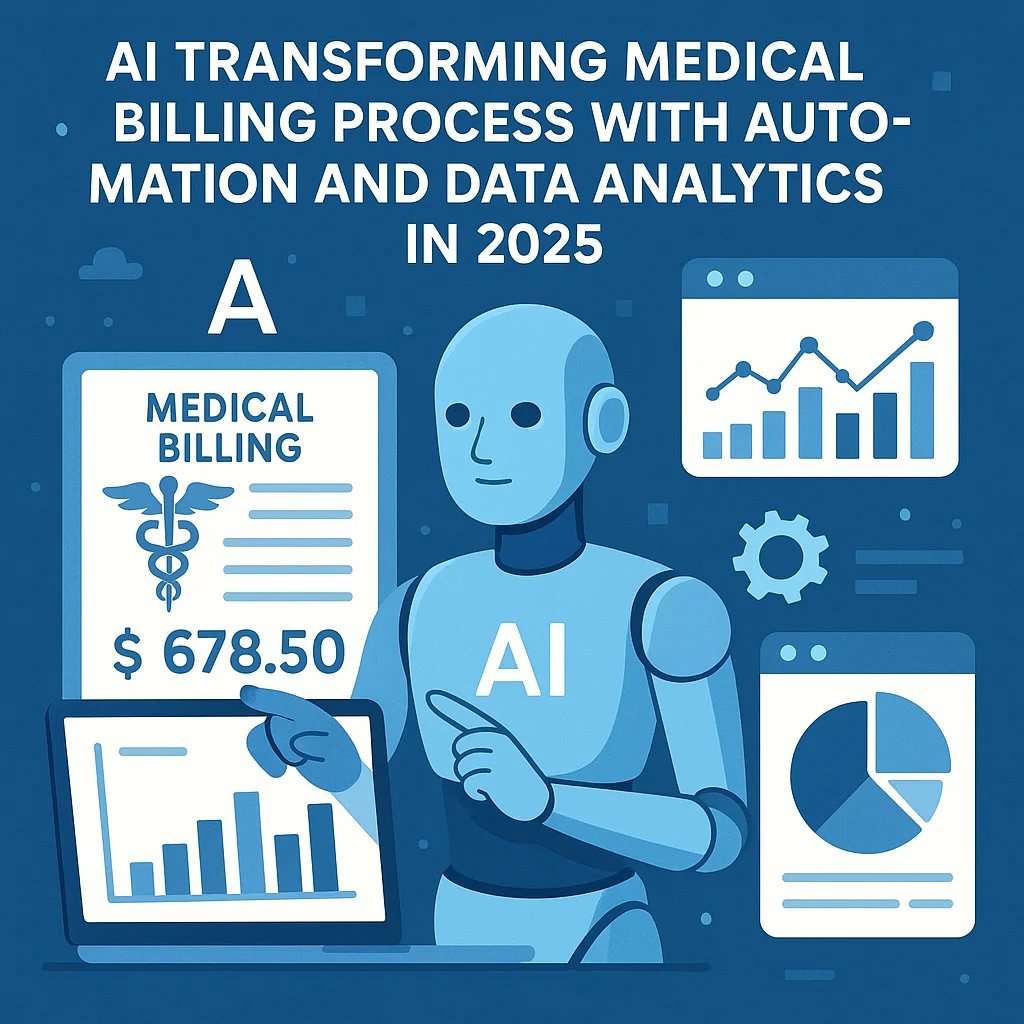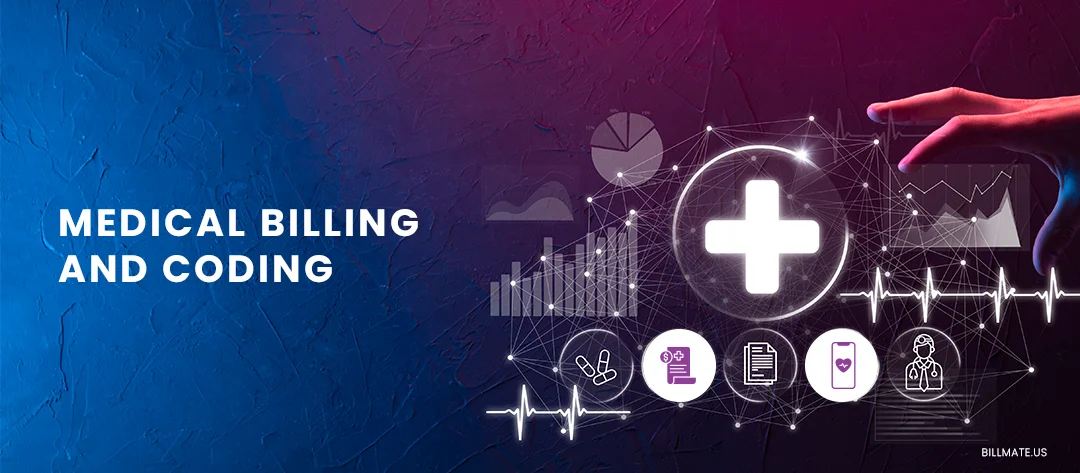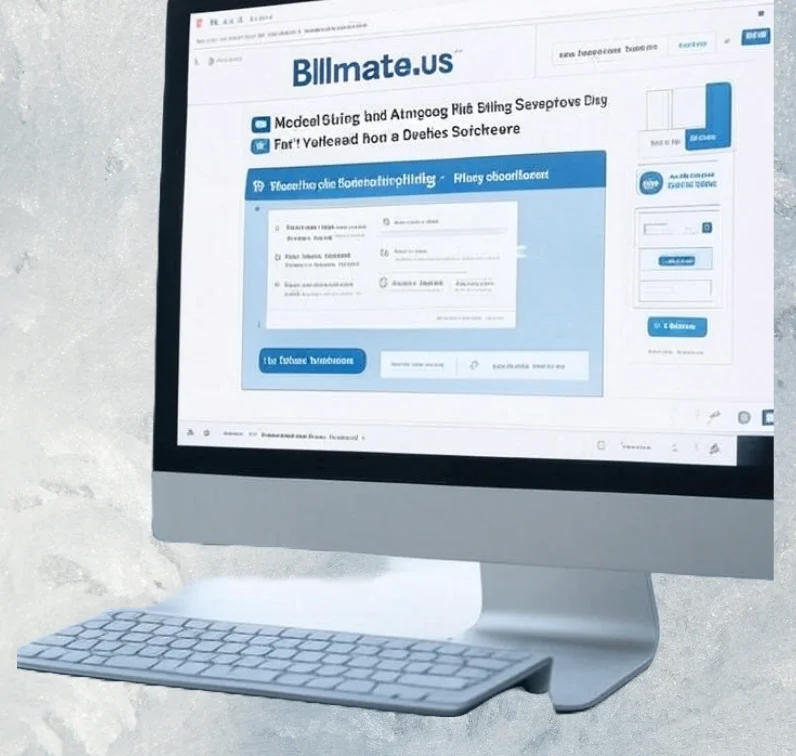
How AI Is Revolutionizing Medical Billing in 2025: Automation, Accuracy & Advanced Analytics
By Billmate
June 18, 2025, 8:01 a.m.
How AI Is Changing Medical Billing in 2025
Introduction to AI in Healthcare Billing
What is AI in Healthcare Billing?
Imagine having a digital assistant that not only understands medical terminology but also knows how to streamline insurance claims, apply codes, and flag errors—all in a flash. That’s AI in healthcare billing today. It combines natural language processing (NLP), gadget mastering, and automation to replace repetitive tasks like AI declaration processing, AI scientific coding, or even AI claim scrubbing. So in preference to manually clarifying code mismatches or chasing lacking bureaucracy, healthcare teams can focus on what honest topics: affected person care.
Why 2025 Is a Turning Point
This year is the tipping point for AI adoption in billing—and there are good reasons why:
-
Digital healthcare is mainstream—nearly all patient data is online now.
-
AI tech has matured—smarter algorithms and better NLP models make tasks like AI coding accuracy more reliable.
-
Regulatory comfort is growing—payers now support AI-based workflows that reduce fraud and boost reimbursement.
Understanding AI Medical Billing
What Makes AI Medical Billing So Powerful?
The beauty of AI medical billing lies in its ability to learn and anticipate. Algorithms spot frequent reasons for claim denials, predict payment likelihoods, and recommend fixes—all by examining past data. Providers using these systems often see a 30–40% gain in claim approvals and can get paid up to 50% faster.
How AI Medical Billing Software Works
-
Connect to your EHR and gather patient data.
-
Automatically follow scientific codes (ICD-10, CPT, and so forth) with the use of AI medical billing software.
-
Perform AI claim scrubbing to spot errors and missing info.
-
Submit clean claims automatically.
-
Use AI denial management to analyze any rejections, fix issues, and resubmit.
It’s fast, precise, and frees your team from pesky administrative chores.
AI Medical Coding—Accuracy and Efficiency
The Role of AI in Medical Coding
Manual coding is overwhelming—thousands of codes, constant updates, and tight deadlines. AI medical coding tackles this using NLP and ML to read clinical notes and confidently assign the correct codes. It’s faster, less error-prone, and more consistent than traditional methods.
Enhancing AI Coding Accuracy with Machine Learning
As more claims go through the system, the AI learns. It notices coder adjustments, payer preferences, and regulatory changes—then adjusts its suggestions to match. Eventually, you end up with a system that’s both fast and remarkably accurate.
AI Claim Processing and Scrubbing
What Is AI Claim Scrubbing?
Before sending claims out, AI checks for mistakes: missing documentation, invalid patient IDs, mismatched codes. This AI claim scrubbing greatly increases your chance of acceptance on the first try—which means getting paid more reliably and quickly.
Benefits of Automated Claim Processing
-
Faster turnaround: fewer rejections = sooner approvals.
-
Lower costs: less manual back-and-forth with payers.
-
Happier patients: no surprise bills, no billing delays.
AI even flags claims at risk of denial in real-time, giving you a chance to fix them before submission.
AI-Powered Denial Management
Identifying and Reducing Denials Automatically
Claims get denied for lots of motives—missing info, old codes, and so forth. AI denial control equipment learns from past claims and proactively flags problems before they show up, cutting denials by as great a deal as 60%.
Learning from Rejected Claims
When a claim is denied, AI logs the reason, tweaks its rules, and updates workflows. The more it learns, the fewer denials you’ll see. Dashboards help your team track trends and quickly address recurring problems.
AI Revenue Cycle Management (RCM)
Streamlining the Revenue Cycle with AI
RCM covers everything from registration to payment collection. AI ties all these steps together: eligibility checks, coding, claim scrubbing, denial prevention, followed by payment tracking—and even patient billing reminders.
Real-Time Insights and Predictive Billing
Forget waiting for monthly reports. AI dashboards give real-time updates on unpaid claims, cash forecasts, and payer performance. You can even predict which claims might get delayed and act before it hits your bottom line.
Pre-Authorization and AI Automation
What Is AI Pre-Authorization in Medical Billing?
Manual pre-auths have always been a headache—endless paperwork and phone calls. Now, AI pre-authorization medical billing tools analyze the service details and determine instantly whether prior approval is needed. Some can even auto-fill forms and submit requests.
How Automation Saves Time and Cuts Costs
Automation slashes pre-authorization time, lowers administrative costs, and removes not unusual errors. This speeds up scheduling and boosts patient satisfaction.
The Rise of AI Billing Analytics
From Data to Actionable Insights
AI billing analytics transform mountains of financial data into clear action items—spotting coding errors, revealing top-performing services, tracking denial reasons, and forecasting cash flow.
Improving Financial Outcomes with Analytics
AI doesn’t just report what happened—it forecasts what will happen. You’ll know which insurance companies delay payments and why. You’ll even get predictions about future reimbursements. That accuracy helps reduce financial risk and maximize revenue.
AI-Enabled Medical Coding Solutions
Combining AI Tools for Coding Efficiency
The real power of AI-enabled medical coding comes from combining technologies—NLP to read notes, ML to learn payer rules, and robotic process automation (RPA) to finish repetitive tasks. The result? A workflow that’s fast and precise.
Customizable Solutions for Every Practice
Not all clinics are identical. Specialty-particular practices (dermatology, orthopedics, oncology, and so on) can get AI solutions tuned to their particular wishes. These structures recognize the maximum applicable codes—keeping billing correct and pressure unfastened.
Challenges of AI in Medical Billing
Privacy and Compliance Concerns
Handling affected person information approaches obeying HIPAA, GDPR, and other privacy legal guidelines. AI carriers now provide steady, encrypted structures. But you want to make certain your provider is compliant, obvious, and responsible.
Integration with Legacy Systems
Older EHR systems frequently require warfare to connect with cutting-edge AI tools. But mature carriers now offer strong APIs, middleware, and sandbox testing that will help you transition with out disrupting workflows.
The Future of AI in Healthcare Billing
AI and the Next Generation of Billing Systems
The next wave of billing tech will be fully cloud-based, voice-driven, and AI-powered. Imagine doctors dictating notes, AI generating codes, securing authorizations, submitting claims, and tracking payments—all in real time.
Will AI Replace Human Coders?
Definitely not. What’s happening instead is that coders are evolving—from data-entry staff into quality overseers and strategy advisors. AI handles the grunt work; humans focus on exceptions, audits, and high-level insights.
Best AI Medical Billing Software in 2025
Key Features to Look For
Look for tools that include:
-
Real-time claim scrubbing
-
AI medical billing software with coding and denial management
-
Pre-authorization automation, analytics, and compliance features
-
Full EHR integration and cloud security
Top Players in the Market
-
Olive AI—robust and full-featured RCM automation
-
Nym Health—strong focus on autonomous medical coding
-
Infinx—specialty in claim scrubbing, denial management, and pre-auth
-
Change Healthcare—excellent for billing analytics and workflows
-
ZyDoc—combines dictation and coding into a seamless package
Case Studies: AI Success Stories in Medical Billing
Hospitals Using AI for Billing Efficiency
A Texas hospital with 300 beds cut denials by 40% and increased net revenue by 25% within six months of switching to AI-based RCM. Automation freed staff, improved cash flow, and better supported clinicians.
Clinics Benefiting from AI Coding Accuracy
A California dermatology clinic slashed coding errors by over 70% using AI coding tools. An urgent care in Florida saw a 30% increase in patient collections through AI billing analytics and revenue predictions.
How to Get Started with AI Medical Billing
First Steps for Healthcare Providers
-
Pinpoint your billing pain points—are denials too high? Collections slow?
-
Assemble a team: billing, IT, compliance, and clinical staff.
-
Analyze your current system and data readiness.
-
Set a realistic budget and ROI goals.
Choosing the Right AI Billing Partner
Prioritize providers with:
-
Proven results in healthcare AI
-
HIPAA and security certifications
-
Strong EHR integration
-
Specialty-specific features
-
Reliable support, training, and scalable implementation
Start small with a pilot department, measure metrics, and expand gradually.
Conclusion
AI in 2025 isn’t science fiction—it’s reshaping healthcare billing in actual time. From AI clinical billing automation to AI denial management, this era saves time, reduces errors, and boosts sales. It empowers carriers to redirect energy towards affected person care whilst giving leaders actionable monetary insights.
But the name of the game sauce isn't always just adopting AI—it’s deciding on a smart implementation plan with the proper companions and approaches
With thoughtful strategy, AI becomes your strongest financial ally.
FAQs
What is AI medical billing?
AI medical billing uses intelligent software to automate and optimize billing, coding, and claim processing.
Can AI completely automate billing and coding?
AI handles most routine tasks, but human oversight remains essential for complex and exception cases.
Is AI billing software safe and HIPAA-compliant?
Yes—leading providers build platforms that protect patient data and ensure regulatory compliance.
How accurate is AI in coding and claim processing?
With careful setup, accuracy can exceed 95%, significantly reducing denials and boosting reimbursement.
What are the costs associated with implementing AI in billing?
Upfront costs vary, but ROI comes through faster claim cycles, fewer denials, and reduced overhead
What to read next

By Billmate | July 19, 2025
Mastering Medical Billing in 2025: Trends, Tools, and Tactics for Success
Explore the top medical billing trends in 2025 including CPT code changes, HIPAA-compliant software…

By Billmate | July 18, 2025
Your 2025 Guide to Medical Billing and Coding: Jobs, Salaries & Online Courses with Billmate
Discover everything you need to know about medical billing and coding in 2025—career paths, salarie…

By Billmate | July 17, 2025
Ultimate Guide to Telemedicine Billing in the USA
Learn how to optimize telemedicine billing and medical coding in the USA with Billmate. Maximize re…
Join our team to be a part
of our story
Learn more about our career, education and
posting jobs, and
submit simple application.

